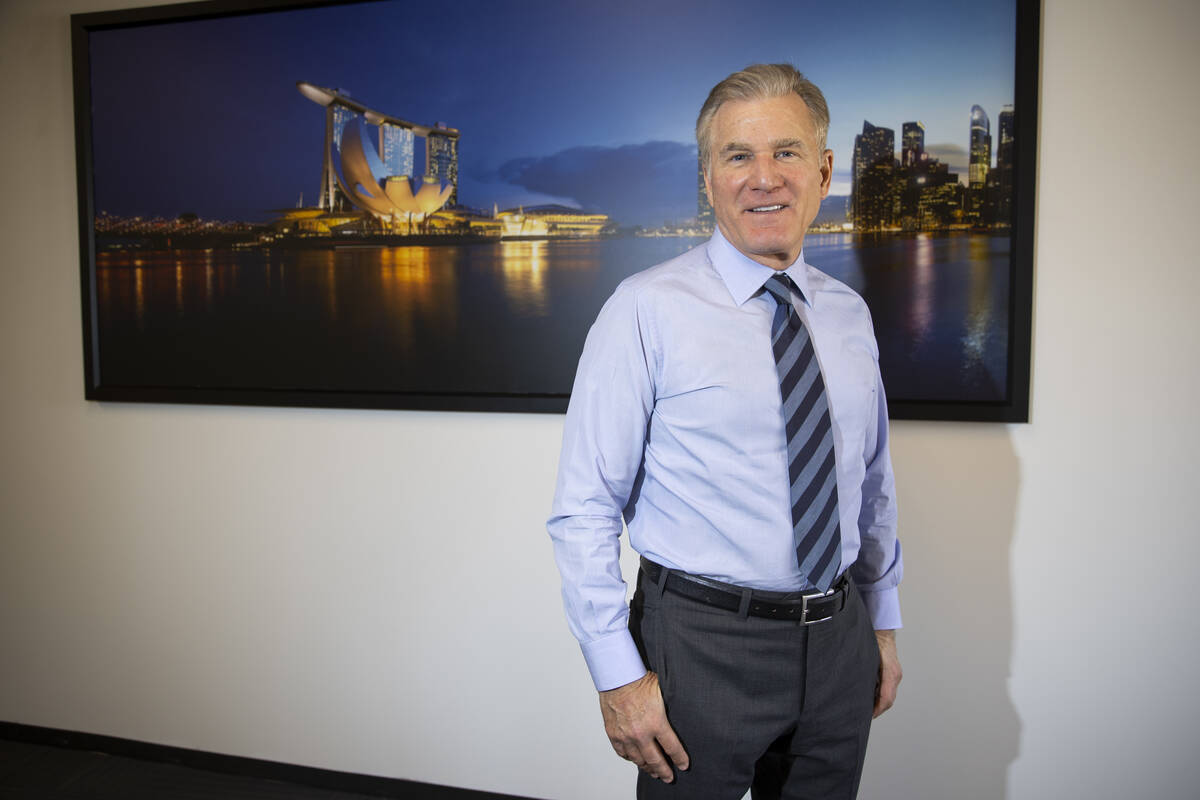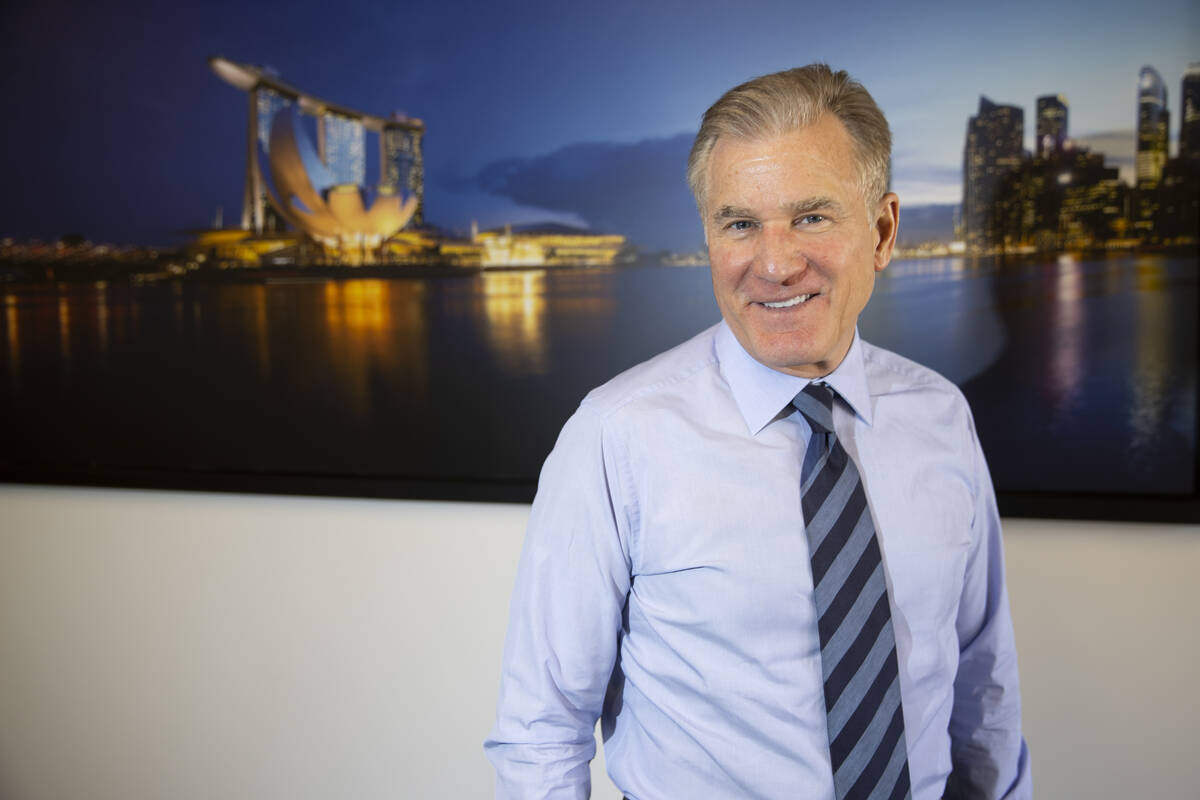New chapter for Sands includes Macao, Singapore, US markets
Rob Goldstein stunned the gaming industry one year ago when he announced Las Vegas Sands was selling its Las Vegas Strip assets, The Venetian, Palazzo and The Venetian Expo, to New York-based Apollo Global Management Inc. and Vici Properties Inc., for $6.25 billion.
Goldstein was then president and chief operating officer of the company, and today serves as chairman and CEO.
He and the other Sands executives have now left their offices at The Venetian for temporary offices at Tivoli Village near Summerlin while the new Sands corporate headquarters is built in southwest Las Vegas. Goldstein talked with the Review-Journal last week about the future of the company founded by the late Sheldon Adelson and the decision that changed the city’s gaming industry landscape.
This interview has been edited for length and clarity.
Review-Journal: What was the hardest part about the decision to sell Las Vegas Sands’ local assets?
Goldstein: Obviously, the history and the memories of what happened. LVS began in the mid-’90s at The Venetian and the memories are endless and very fond. Emotionally, it was very difficult. It was an incredible venture from the day Sheldon started. I started in ’95. The success of that building was what catapulted us into Macao and Singapore and, eventually, Pennsylvania. It all began there. Wherever you begin, it’s difficult emotionally. I made a lot of friends and a lot of people I worked with side by side for decades. It’s hard not to be emotional, but you have to make decisions for other reasons sometimes, and we did. It was an opportunistic sale for us. Had we not gone through the COVID mess, we probably wouldn’t have done it. Most people don’t realize Sheldon was a part of that decision. It was a painful decision for him, too, but we made it.
Las Vegas Sands plans to continue to be a part of the local community. Describe what that will look like.
We’re going to have an employee base of 300 or 400 people, which is considerable. We’ll have an office here. We have this temporary office, and we’re building one on Durango that we’ll move into sometime late this year or next year. We will stay in Las Vegas and be a part of the community and live here. With 300 or 400 people, it’s not the presence we had with Venetian and Palazzo, but we’ll still remain very dedicated to Las Vegas. We’ll have people in design, construction, IT, human resources, legal. We still run a business that employs 40,000 people over there in Asia and the corporate headquarters remain here in Las Vegas. We interface with Asia every day, and we have all the usual things you have with casino and hotel operations. In that sense, our corporate group remains pretty much intact.
The company adopted and perfected the integrated resort concept in Las Vegas. How will use of that model be applied in future Sands projects?
It depends on the jurisdiction, but obviously our preferred approach is an IR (integrated resort) model with a multitude of offerings for customers ranging from casino, hotel, spa, convention, retail, restaurants and business centers. The model works, and we’ll continue to use that model in future developments. We’re talking to three states right now, and that’s the preferred approach. We’re also in discussions in a few places in Asia. We’re building a new one hopefully starting next year, our second Marina Bay Sands in Singapore, a fully integrated Phase 2 of our Phase 1. We don’t plan to stray from the IR model unless the jurisdiction doesn’t want an IR. That’s how we see ourselves, as large-scale IR developers. That’s our bread and butter.
What’s the status of the company’s online sports wagering strategy?
We’re not in the online sportsbook wagering business. We’ve watched it carefully. We are getting involved in a few things digitally. But we have no real approach to being in online sports or online gambling as it relates to today. That market has proven to be interesting to watch with all its ups and downs. I’m convinced it will become profitable and be very successful, and there may be a point we get interested by buying, acquiring or beginning our own online sports. But at this point, we’re not in that business.
The company has made its strategy clear: a focus on Macao, Singapore and other possible domestic markets. Why?
Keep in mind that 90 percent of our cash flow emanates from Asia. People don’t understand our company. Is your company ending? No. The company made 8 percent of its EBITDA in Las Vegas and 92 percent out of Macao and Singapore in ’19. So our businesses in Macao and Singapore are the backbone of what we are. It doesn’t mean we’re an Asia-only company. We’re looking right now to be in the U.S. in multiple jurisdictions. We’re headquartered here. We’ll continue to compete for licenses. There may be more that we’d be looking at. We had a horrific couple of years with COVID and it’s not over over there. I’m soon going back to Singapore for the first time in years. Singapore’s back to a U.S.-type trajectory. Demand is picking up. It’s opening up and they’ve done a terrific job. But Macao is still struggling. China and Hong Kong are going through a very tough time and our business there has been battered.
Let’s run through the portfolio and some of the prospective projects. What’s the company’s status in Macao?
We’re the dominant player in Macao and we’ve got multiple properties there with six different casinos. We’ve just finished the renovation of the Londoner. We spent over $2 billion U.S. making it a pretty exciting place. I haven’t seen it in person, but I’ve seen enough video to believe it’s pretty extraordinary with 6,000 keys. The Venetian is still there with 3,000-plus keys. The Four Seasons, we redid that, probably the best property we’ve ever done in terms of quality. We still have the old Sands, which we started in 2004. We have the Parisian. We have a lot of things happening in Macao. Unfortunately, the market there is just very challenging and until they open the doors up in China and Hong Kong, it remains challenging. We were the dominant player in that market for many years. We have the most invested, about $15 billion U.S., and we’re hoping to invest more and be a part of that market when it resurrects this year or next. At the peak, that was a $3.5 billion EBITDA market for us. Pretty extraordinary.
So when the market returns, you’re right back in the driver’s seat, right?
We believe so. And we’re eager to see that day come. I never dreamed we’d be two years later. I was in Beijing in January of ’20 with Sheldon, the last time he traveled internationally. And the ambassador at the time said, “There’s this thing in Wuhan, a virus down there,” and we didn’t have any idea what that meant at the time. If you had told me two years later that we’d still be fighting this war, I wouldn’t have believed you, but here we are. The situation remains frustrating. We’re hoping for a change quickly. But Macao remains our dominant position and we’re very proud of the work we’ve done there. We have 13,000 rooms and 30,000-plus employees. The backbone of the company’s success is in Macao.
Singapore?
Singapore is extraordinary. We’re very proud of the iconic Marina Bay Sands. It’s fully open again. Indonesia and Malaysia are the key feeder markets coming back. We’re starting to see visitation. We hope to see more this month from Japan and Korea. Singapore feels like it’ll be back to full throttle by summer, except we won’t have visitation from China because China is still closed. But the rest of the Pacific Rim will open up to Singapore, and I think Singapore will do very, very well. We’re investing $1 billion into the rooms, food and beverage and we’re building new amenities there. We’re hoping to begin construction of a brand-new Marina Bay Sands II sometime in ’23. So we’re very bullish on MBS coming back to full throttle this year.
Texas?
Texas is a work in progress. (Legislative) decisions will depend on whether it’s on the ballot in ’23. We’ve been in Texas now for a couple of years. We’ve got a lot of people down there working with us. It’s an extraordinary market. What we’d do is build a large-scale IR anyplace they’d want us to build. We’re big fans of the state. We’d love to have a presence there. We’ll hopefully be building sometime in ’24 if it passes in ’23. But there’s nothing in Texas until they put it to a vote, and we hope we get a favorable decision. I think people would vote for gambling in Texas given the chance.
Florida?
In Florida, we failed recently. We had a disappointing outcome, but I think it’s in early innings. We will be in Florida, in my opinion. It’s just a question of when it happens. The state will open up, I believe, to top-tier gambling companies in the next couple of years. We had a very close run this time and we’re far from finished. We’d love to do something special, something first tier in Florida.
New York?
New York’s exciting. Our team has been focused on New York for a number of years. It looks like finally it’s going to happen, a third license will be granted sometime in the next 12 months. Of the three licenses, it looks like the first two will be granted to the existing operators, MGM and Resorts World. We’re hoping to compete for the third license. We’re deep in the hunt and we’re hoping for some favorable news there in the next 12 months. It would be a huge market for us.
You indicated there may be something happening in other Asia markets.
There is. I don’t want to say where, but we’ve had some rather interesting conversations with a major country there that has reached out to us. It’s proprietary, but we’re looking to build something of scale much like Marina Bay Sands. A lot of countries in Asia have reached out to us over the years, but nothing’s happened. This one feels like it might be a major prospect. A major country, a top-tier country. I hope it’s real.
But you’re definitely out of Japan at this time, right?
We are. We went through a lot of work in Japan and it was very disappointing. It’s a wonderful country and I miss going there. I miss the hospitality, the people and the extraordinary culture. From our perspective, we could never get it to move along to our satisfaction, so we packed up and called it a day.
Do you foresee an opportunity for Sands to build something new in Southern Nevada?
Never say never. There’s always that possibility that we’d do something in the future. We do have a non-compete (agreement) in place with the folks who bought our building at The Venetian and Palazzo. Look, Nevada’s home. Always will be. We’re very fond of the market. We never questioned the quality of the market; we questioned how we could deploy capital better with other opportunities. But I think it’s a fabulous place. We’re huge fans of Las Vegas. My family will stay here forever and I will stay here forever. I think our team loves living here. Would we reconsider Las Vegas at the appropriate time and if we got through our legal issues with our non-compete? Yes. Absolutely.
The Review-Journal is owned by the Adelson family, including Dr. Miriam Adelson, majority shareholder of Las Vegas Sands Corp., and Las Vegas Sands President and COO Patrick Dumont.
Contact Richard N. Velotta at rvelotta@reviewjournal.com or 702-477-3893. Follow @RickVelotta on Twitter.





















